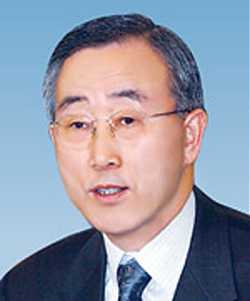At a presser in Benghazi on Saturday, Jalil said his forces would lay siege to pro-Qadaffy
...who single-handedly turned a moderately prosperous kingdom into a dictator's fantasyland...
cities until a deadline for their surrender expires next week.
Jalil said his forces are supplying the cities of Sirte, Bani Walid, Jufra and Sabha with humanitarian aid despite the siege.
He denied media reports that the interim authorities have ordered fighters to leave the capital Tripoli. "No decision has been made by the council to collect weapons from the revolutionaries or send them outside Tripoli," he said.
Investigations are underway to expose any institutional corruption in Libya, he said. "At this time there has been some information on financial corruption within institutions will investigate this matter and report the names," said Jalil.
Al Jizz's Sue Turton reporting from near Bani Walid said she witnessed a group of representatives from Bani Walid negotiating with the Libyan revolutionary fighters. The team from Bani Walid told the Libyan fighters that they want two more days before surrendering their weapons.
"The Libyan fighters are getting quite cross, they are saying we have been negotiating with you for months to lay down your weapons," Turton said. "They are suspicious and are still not completely convinced that this surrender is going to happen."
An NTC military commander said his fighters have given forces in Bani Walid until 08:00 GMT on Sunday to surrender, adding Qadaffy's son Saadi was still there but another, Seif al-Islam, had decamped.
NTC fighters said their forces had established a frontline about 30km from Bani Walid.
The city, along with Sirte on the Mediterranean coast and Sabha deep in the Sahara desert, are the main pockets not under the control of NTC forces.
At a news conference in Tripoli, Ali Tarhouni, the interim oil minister, said there had been no fighting in Bani Walid on Saturday. Asked if Qadaffy was in the town, as claimed by NTC military commanders, Tarhouni said: "As for Qadaffy himself...we know where he is."
Qadaffy's front man dismissed suggestions that Bani Walid was about to surrender and insisted that tribal leaders there were still loyal to colonel.
"Bani Walid is a major city hosting one of the biggest tribes in Libya who have declared their allegiance to the leader and they refused all approaches for negotiation with the Transitional Council," Moussa Ibrahim told Rooters news agency.
Ibrahim, who called Rooters in Tunisia to make a statement accusing the Gulf Arab state of Qatar of promoting Islamist rule in Libya, declined to say where he was speaking from.
Asked about Qadaffy's whereabouts, Ibrahim said he did not know: "But I know very much that he's in the country -- this is for sure... And he's in a safe place surrounded by many people who are prepared to protect him."
Security for Tripoli
Tarhouni also announced the creation of a supreme security council to protect Tripoli.
"This committee represents all those who are concerned for the security of our new capital," Tarhouni, who chairs the newly formed body as well as the NTC's executive committee, said.
In their first meeting, the 17 members of the committee agreed that the capital's security was the general responsibility of the interior ministry, which resumed work on Saturday, and of the police force in particular.
"The main goal is to protect citizens, as well as public and private establishments, and to eliminate what remains of pro-Qadaffy groups, or what is called the fifth column," Tarhouni said.
The committee, which he said includes the majority of the revolutionary groups in the capital, also decided to include "remaining groups" under its umbrella and expected "no problems" in this regard.
"I do not anticipate any problems in other groups joining this committee," Tarhouni said, adding that revolutionary units will temporarily assist police forces in securing the streets of the capital.
These groups, he said, will leave the city as soon as the city's police, which boasts about 7,000 men, can fully take over.
Tarhouni also announced the creation of a new committee charged with centralising prisoners of war in a "safe and secure" location to ensure that their legal and human rights
...which are usually entirely different from personal
liberty...
are respected.
Police were back on the streets of Tripoli and business slowly resumed at the end of a week of fighting and festivities.
UN role
Meanwhile,
...back at the buffalo wallow, Tex and his new-found Indian friend were preparing a little surprise for the bandidos...
a special envoy for
 the ephemeral Ban Ki-moon
the ephemeral Ban Ki-moon... of whom it can be said to his credit that he is not Kofi Annan...
, the UN secretary general, has arrived in Tripoli.
Ian Martin landed at a military airport as Ban said the world body was ready to assist in re-establishing security after the nearly seven-month uprising that toppled Qadaffy.
"I am here now to discuss with the National Transitional Council how the United Nations
...an organization whose definition of
human rightsis interesting, to say the least...
can be most helpful in the future," he told news hounds on arrival.
Martin arrived amid questions about the UN's future role in the country, particularly about whether a peacekeeping mission will be necessary.
"I think the future leaders of Libya face a very big challenge, they have already shown the ways in which they are ready to tackle that challenge and it will be the commitment of the United Nations to assist them in any way they ask."

 International Criminal Court
International Criminal Court
 BENGHAZI, Libya In the days after Libyas rebels rose up against Moammar Gaddafi, they faced a vexing challenge: How do you pay for a revolution?
BENGHAZI, Libya In the days after Libyas rebels rose up against Moammar Gaddafi, they faced a vexing challenge: How do you pay for a revolution?